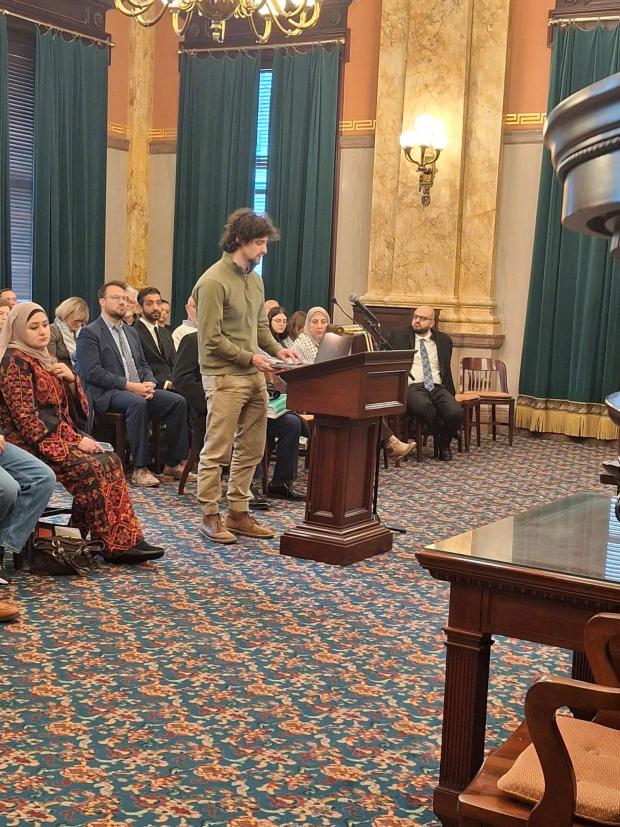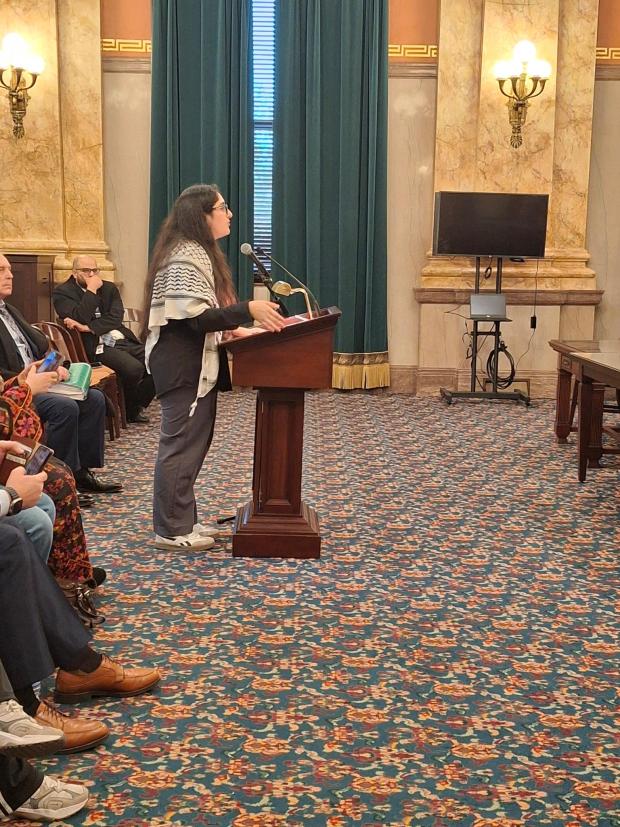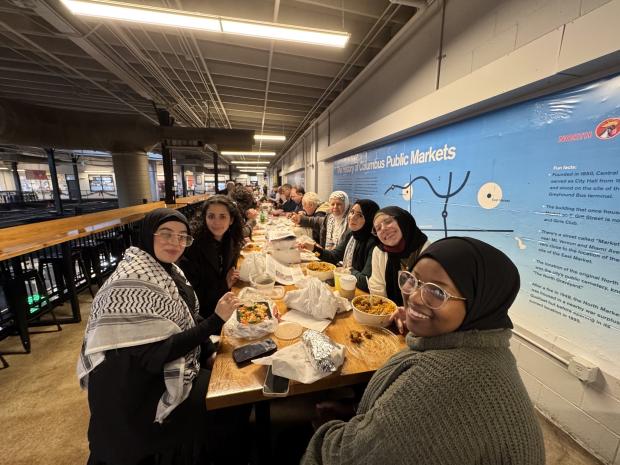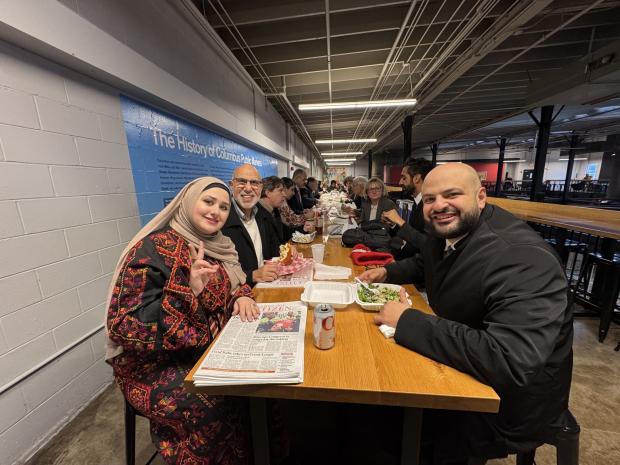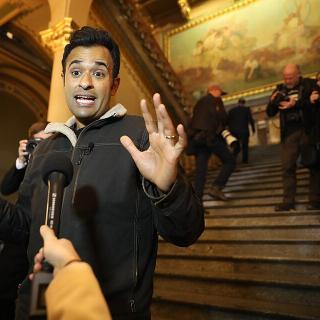A broad coalition of democratic organizations from across the state have mobilized to protect free speech rights from a secretive attempt by right-wing lawmakers to make public criticism of the state of Israel illegal in the state of Ohio.
This is the story of how they did it – how people of all different backgrounds came together on short notice, learned to navigate the convoluted cutlure of the Ohio statehouse, and faced down a powerful lobby determined to shield the state of Israel and its supporters in the US government from accountability for the ongoing genocide in Gaza.
Faten Odeh, the executive director of the Cleveland chapter of The Council on American–Islamic Relations (CAIR-OH), had heard rumblings of states intending to codify the IHRA definition of antisemitism into law, but could have never anticipated how fast legislation around the definition would develop in Ohio. Perhaps a bigger surprise was how quickly she, along with Ann Ghazy, Jawhara Qutiefan, and a myriad of other organizers were able to mobilize large numbers of people to help protect free speech from government overreach.
The IHRA definition of antisemitism, which provides several contemporary examples, has become a hot button issue around the country. The definition is legally vague and includes criticisms of the state of Israel. Codifying a broad definition of antisemitism could allow law enforcement to target those who criticise the state of Israel for the genocide in Gaza and the continuing apartheid in the occupied West Bank.
Aspects of the provision seem inspired by last summer’s student encampment movement, which saw student protests on dozens of college campuses from Columbia to University of California, including at Ohio State. For example, SB 297 would have made illegal demonstrations of five or more students which potentially obstructed the conduct of state business, including state universities.
The IHRA measure would essentially prohibit public speech protesting the actions of one specific foreign government, the state of Israel. No such provisions exist for any other foreign entity.
Given the controversy around the IHRA definition, it came as a surprise to many when it was discovered that there was a push by the state Senate during the lame duck session to codify the definition into Ohio law via Senate Bill 297 (S.B. 297).
Upon the discovery of the Senate’s intent to codify the IHRA definition, organizers and advocates for Palestinian human rights rapidly organized to fight the legislation. Members of CAIR-OH, Jewish Voices for Peace (JVP), Ohio Progressive Asian Women's Leadership (OPAWL), the American Civil Liberties Union (ACLU), and other coalition partners came together with incredible speed to organize opposition to the legislation. S.B. 297 was approved by the senate.
However the the House declined to review and vote on the bill before the end of the legislative session following an intense campaign of phone calls and emails to senators and representatives throughout the state, the submission of written and vocal testimony in opposition to the bill for committee hearings concerning S.B. 297, and well coordinated use of social media along with active outreach to more traditional media outlets.
Basma Hamid of Cleveland Palestine Advocacy Community (CPAC) was among those who testified against the bill, “This is a repression bill, and weaponization of civil rights and free speech, it is not about protecting anyone… we need to mobilize against it.”
However, the defeat of S.B. 297 was not the end of the effort to codify the IHRA standards of antisemitism as lawmakers quickly pivoted by appending the measure to House Bill 315 (H.B. 315), a “Christmas Tree Bill” originally concerned with Township funding.
The coalition pivoted again, mobilizing rapidly to contact representatives and mobilize opposition to the legislation, even organizing a demonstration in the Statehouse rotunda on December 17 to oppose the bill.
In the course of the fight against SB 297, a network had formed among diverse organizers in cities across the state. In Cleveland and Cincinnati, activists arranged transportation to the state capital. Faten Odeh, Executive Director of CAIR-Cleveland & North, rented a van and waited in the cold predawn parking lot as new allies from across Cleveland showed up and climbed on board for the trip down to Columbus.
Odeh recalled the conversations on the long drive to the state capital, “We talked the whole drive. We got to know each other. I’m a social studies teacher - we teach about the American colonists fighting for freedom and their right to free speech. But why is it that when we speak out, when we protest, it’s treated differently? The fight for freedom won’t stop on our watch.”
This coalition built around CAIR, Jewish Voice for Peace, Students for Justice in Palestine, the American Civil Liberties Union, and other groups staged a dramatic sit in in the rotunda of the state capital later that day.
As a result of the effort, the House stripped the IHRA provisions from the final HB 315 bill, securing a victory for free speech. This represented the second time in the same week that this coalition had successfully opposed the IHRA provision after the defeat of SB 297 in the Ohio Senate just days earlier.
In the final hours rumors spread about the IHRA definition being attached to Senate Bill 158 (S.B. 158) in the dead of night. Organizers with the coalition kept the pressure on state legislators with a final push of calls and emails and the effort was ultimately dropped.
Jawhara Qutiefan, From AMP columbus, SJPOSU and JJPOSU, was especially thankful for the people in Cleveland, Toledo and Cincinnati, who participated in a large way and went out of their way to travel to Columbus in order to demonstrate and give oral testimony against the legislation. She stressed that at a moment when politicians likely thought people were not paying attention, or had given up altogether, a network of over 800 people came together and mobilized to fight back.
Additionally, the large network of people represented a wide range of professional backgrounds, from people with skills in designing visually appealing posts for social media, to lawyers who rapidly kept up with changes to legislation and administrative procedure. Odeh described how she, along with colleague Anisa Liban and others, were able to develop connections with staffers at the Statehouse who helped them stay up to date with what was happening in real time, despite poor communication from state legislators.
Ann Ghazy, of CPAC emphasized the usefulness of the communication networks between groups and group members, as social media, shared drives, and messaging apps helped the group rapidly fill out and submit forms, follow necessary procedures, develop call and email scripts, and keep track of which legislators had been contacted.
Ghazy went on to mention how the diversity of the group was vitally important. Jewish voices played a pivotal role in the advocacy and the diversity of the group helped shape messages and scripts that had appeal to state representatives with widely different constituencies.
Asked about next steps, Odeh emphasized that she knows that this battle is likely not over, but she is confident that this robust and dedicated network of advocates will be ready to mobilize once again when the need arises.
After her testimony in opposition to S.B. 297, Faten was headed back to Cleveland, along with a member of JVP and a pastor from the United Church of Christ. The group stopped for dinner at a Wendy’s and had a heartfelt discussion about the atrocities taking place in Gaza and how anyone could try to strip away the right to discuss these atrocities in public discourse. The group all agreed on the importance of continuing to fight for this cause, before grabbing their dinner to share on the return trip. A Muslim, a Jew, and a Christian found common ground in human decency, and organized together for democracy and peace.

